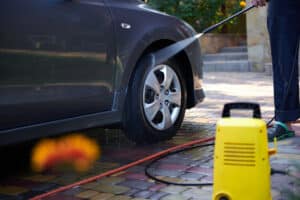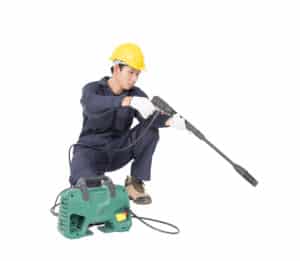How to Choose the Right Size and Power Output for Your Gasoline Pressure Washer
Key Takeaways
- The first step in choosing the right size and power output for your gasoline pressure washer is understanding the specific cleaning tasks you need to accomplish.
- Consider the PSI and GPM ratings of a gasoline pressure washer, as they directly affect the cleaning power and efficiency.
- Ensure that the power output of the pressure washer matches your cleaning requirements to ensure smooth and efficient operation.
When it comes to cleaning tasks that require some extra power, a gasoline pressure washer can be a valuable tool. Whether you need to clean your driveway, remove tough stains from your deck, or tackle heavy-duty industrial projects, choosing the right size and power output for your gasoline pressure washer is crucial. In this article, we will explore the factors you need to consider to make an informed decision.
Understanding the Cleaning Task
The first step in choosing the right size and power output for your gasoline pressure washer is understanding the specific cleaning tasks you need to accomplish. Different projects require different levels of pressure and flow rate to achieve optimal results.
If you have smaller and lighter tasks such as washing cars, cleaning patios, or removing dirt from fences, a lower-end electric pressure washer may be sufficient. These models typically have a PSI (pounds per square inch) rating ranging from 1500-2000 PSI, which is suitable for lighter cleaning tasks.
However, if you have medium to heavy-duty projects like cleaning driveways, removing oil stains from a garage floor, or tackling large-scale industrial cleaning, a middle-end gas or electric pressure washer with a PSI rating between 2000-3000 PSI might be more appropriate.
For the most demanding cleaning tasks, such as removing stubborn grease and grime from heavy machinery or deep cleaning a commercial space, you will need a high-end gas pressure washer with a PSI rating of 3000 PSI or higher. These powerful machines are designed to handle large-scale and difficult projects effectively.
Consider PSI and GPM Ratings
In addition to understanding the cleaning tasks, it’s important to consider the PSI and GPM (gallons per minute) ratings of a gasoline pressure washer. PSI measures the pressure output, while GPM determines the flow rate of water.
The PSI rating directly affects the cleaning power of the pressure washer. A higher PSI means greater force, which can remove stubborn stains and dirt more effectively. However, it’s important to note that higher PSI also means a higher risk of damaging delicate surfaces, so it’s crucial to use the appropriate pressure for each task.
The GPM rating is equally important as it determines how much water the pressure washer can deliver per minute. A higher GPM rating allows for faster and more efficient cleaning, especially for larger areas.
Matching Power Requirements
When choosing a gasoline pressure washer, it’s essential to ensure that the power output of the machine matches your cleaning requirements. The power output is typically measured in watts or horsepower (HP).
Start by checking the power ratings specified by the pressure washer manufacturer. This information can usually be found in the product specifications or the user manual. Calculate the starting power requirements and the continuous power output needed for the tasks you have in mind.
It’s crucial to choose a generator with an output capacity equal to or higher than the power requirements of the pressure washer. This ensures that the pressure washer operates smoothly and efficiently without any power-related issues.
Other Factors to Consider
While PSI, GPM, and power output are the primary factors to consider when choosing the right size and power output for your gasoline pressure washer, there are other factors that can influence your decision:
- Length of use: If you anticipate using the pressure washer for extended periods, you may need a model with higher power output and durability.
- Safety margin: It’s always wise to choose a pressure washer with slightly higher power output than required to ensure you have a safety margin.
- Quality construction: Look for pressure washers with durable construction and reliable components to ensure longevity.
- Additional power needs: Consider any additional power needs you may have, such as operating other tools or equipment simultaneously.
- Future expansion or upgrade possibilities: If you anticipate taking on larger projects in the future, it may be wise to invest in a pressure washer with higher power output capabilities.
Conclusion
Choosing the right size and power output for your gasoline pressure washer is essential to ensure optimal cleaning results. By considering the specific cleaning tasks, PSI and GPM ratings, power requirements, and other factors, you can make an informed decision and select a pressure washer that meets your needs.
Related Websites:
FAQs:
Q: What factors should I consider when choosing the right size of a gasoline pressure washer?
When choosing the right size of a gasoline pressure washer, you should consider factors such as the cleaning tasks and frequency, water flow (GPM), and pressure (PSI). These factors will help determine the appropriate size and power output for your needs.
Q: How does water flow (GPM) impact the selection of a gasoline pressure washer?
Water flow, measured in gallons per minute (GPM), is an important consideration in pressure washer selection. A higher GPM allows for faster and more efficient cleaning. For example, a higher GPM is recommended for tasks like patio cleaning or deck maintenance, while a lower GPM may be suitable for car washing.
Q: What is the significance of pressure (PSI) in a gasoline pressure washer?
Pressure, measured in pounds per square inch (PSI), plays a crucial role in the performance of a gasoline pressure washer. Different applications require different PSI ranges. For instance, higher PSI is ideal for heavy-duty tasks like removing stubborn stains, while lower PSI is suitable for lighter tasks such as washing delicate surfaces.
Q: How does engine horsepower (HP) impact the performance of a gasoline pressure washer?
Engine horsepower (HP) directly affects the performance of a gasoline pressure washer. The higher the HP, the more power the pressure washer will have. As a general guideline, a higher HP is recommended for tougher cleaning tasks, while a lower HP may suffice for lighter tasks.
Q: What is the significance of engine displacement in a gasoline pressure washer?
Engine displacement affects the power output of a gasoline pressure washer. A higher engine displacement generally results in a more powerful pressure washer. The suitable engine displacement range depends on the desired cleaning tasks. For example, larger engine displacements are better suited for heavy-duty cleaning, while smaller displacements may be sufficient for lighter tasks.





